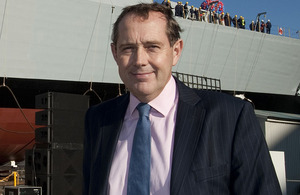Peter Luff announces industrial and technological Green Paper
In a speech to defence industry members, Minister for Defence Equipment, Support and Technology, Peter Luff, today announced that, by the end of 2010, a Green Paper will be published that sets out plans for defence industrial and technology policy.

Peter Luff, Minister for Defence Equipment, Support and Technology [Picture: Andrew Linnett, Crown Copyright/MOD 2010]
Mr Luff appeared at the event organised by ADS, the trade organisation advancing UK AeroSpace, Defence, and Security industries, to encourage industry members to become actively involved in the creation of the Green Paper which will formalise defence industrial and technology policy for the next five years.
Mr Luff began by talking about the outcomes of the recent Strategic Defence and Security Review (SDSR):
Two weeks ago, the Government published this country’s first ever Strategic Defence and Security Review,” he said. “The past few months have been an uncertain and worrying time for everyone in Defence because we all knew that change must come.
As you know, the choices we have made in the SDSR about the future structure of our Armed Forces will result in changes to our equipment and support requirements, and therefore to what we will be buying from industry.
The Defence Reform Unit, under Lord Levene, is undertaking a fundamental review of how the MOD delivers capability, and will report at intervals between now and next July. There will be another Defence Review in 2015, which I trust will be held in a more benign financial environment.
Furthermore, alongside the SDSR, we recognise the need for a more measured, strategic consideration of MOD’s industrial and technology needs, together with industry’s contribution to broader economic competitiveness.
Mr Luff went on to explain how industry members can help sculpt the future for defence policy.
He said:
I am pleased to confirm probably the worst kept secret and the reason that you are all here today - that we will publish a Green Paper by the end of this year, which will set out our intended approach to industrial policy and the closely related issue of technology policy.
There will then be a formal public consultation in the New Year to give everyone who has an interest a chance to contribute. The result will be published in a White Paper next spring that will formalise our defence industrial and technology policy for the five years until the next strategic review.
But the major window of opportunity for industry opens now, today. This is your chance to make a real difference to what the Green Paper says. To influence the way we do business.
To reflect the full scope of the SDSR itself, I am pleased to confirm that both the Green, and subsequent White Papers, will also include security issues. This will mean we can better reflect the new challenges that have been identified such as cyber-related threats.
Mr Luff outlined how positive he believes the relationship between the government and the defence industry can be and he plans to ensure that both bodies are in agreement on all issues.
He said:
You’ve challenged me to think like you do in industry when I approach decisions; to be more commercially-minded. I’m happy to accept that challenge.
Do I share your desire for stability and greater certainty? Yes. Do I want to maintain a healthy skills base, particularly in specialised areas? Yes. Do I understand the requirement for profit and shareholder dividends, and the need to make a decent rate of return? Yes. And am I proud and willing to support exports? Absolutely. Yes.
But industry should be under no illusions about the quid pro quo. Every pound that’s spent on equipment, support and technology must serve the needs of Defence. That means industry’s long-term prosperity depends on offering ever better value for money to the British taxpayer.
Because it is not the Government’s money; it is not industry’s money. It is the money that hardworking people, up and down the land, have entrusted to us so that our Armed Forces have what they need.
At the end of the day Mr Luff explained, the future and capability of the UK’s Armed Forces is the priority:
The primary objective for all of us must be to provide our Armed Forces with the equipment and support they need, at the right time, and at a cost that represents value for taxpayers’ money.
We all agree that Defence acquisition is one of the most complex, costly, yet critical activities of government and industry. And we should never fail to praise the very many successes of all those who work so hard to support our Armed Forces.
Concluding his speech, Mr Luff reiterated the importance of a strong working relationship between Defence and industry members in order to create a more stable base for industry, less dependent on the UK economy alone:
But with the new realities we face, affordability and capability must share equal billing. This means we will seek consistent value for money from industry. Because it ultimately benefits the Armed Forces, it builds your credibility with the Government, and because Parliament and the British taxpayer demand it.
It was Mrs Thatcher who famously noted the similarities between families and businesses when they sit down to do their budgets. They accept that they can’t get everything they want, and focus on what they really need.
In Defence and Security, it’s time that government and industry did the same.